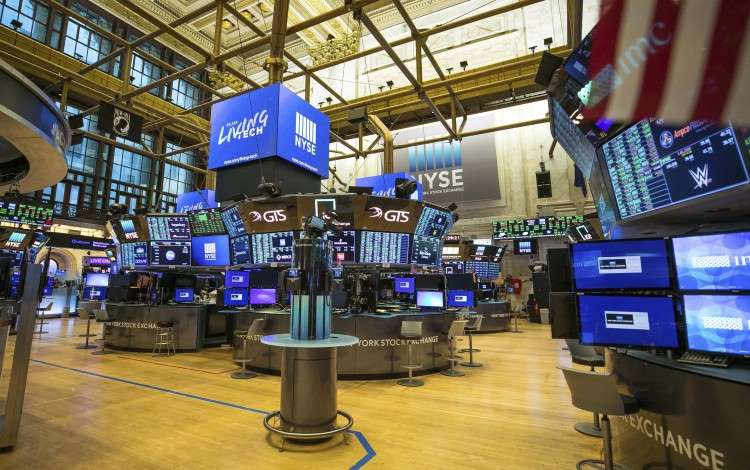By Martin Baccardax, The Street–
The Friday Market Minute
- Global stocks slump amid rising U.S.-China tensions, pulling Treasury bond yields lower and safe-haven currencies higher.
- Beijing orders the closure of the U.S. consulate in Chengdu, while Secretary of State Mike Pompeo calls securing freedoms from the Chinese Communist Party “the mission of our time.”
- European stocks slump, even as PMI data for July shows a robust recovery for the world’s biggest economic bloc at the start of the third quarter.
- U.S. equity futures suggest a weaker open on Wall Street ahead of earnings from Verizion, Honeywell and American Express before the start of trading and PMI data for July at 9:45 am Eastern Time.
U.S. equity futures slipped lower Friday, while Treasury bond yields rallied and the dollar held onto gains against its currency peers, as investors retreated from risk markets amid escalating political tensions between Washington and Beijing.
U.S. Secretary of State Mike Pompeo delivered a major foreign policy speech late Thursday at the Nixon Library in Yorba Linda, California that called securing freedoms from China’s Communist Party “the mission or our time.”
“The truth is that our policies – and those of other free nations – resurrected China’s failing economy, only to see Beijing bite the international hands that were feeding it,” Pompeo said. “The freedom-loving nations of the world must induce China to change … in more creative and assertive ways, because Beijing’s actions threaten our people and our prosperity.”
The speech followed tit-for-tat closures of consulates on Houston and the southwestern Chinese city of Chengdu this week, with both countries accusing the other of breaching international law.
With the U.S. now clearly putting its relationship with China on the front lines of its foreign policy, investors are now starting to question the fate of the so-called Phase 1 trade deal between the world’s two biggest economies, which was reached late last year.
That, along with a worrying rise in weekly jobless claims, which jumped to 1.42 million yesterday after falling for 17 consecutive weeks, and the ongoing rise in coronavirus infections both at home and abroad, has investors in a defensive mood heading into the final trading day of the week.
Futures contracts tied to the Dow Jones Industrial Average suggest a 140 point opening bell decline, while those linked to the S&P 500 are indicating a 15 point pullback for the broader benchmark. Contracts tied to the Nasdaq, which has paced markets around the world with a 21.2% gain so far this year, are priced for a 140 point decline.
The U.S. dollar index, which tracks the greenback against a basket of six global currencies, was marked 0.1% higher in early European trading at 94.73, as investors plowed cash into U.S. Treasury bonds, taking 10-year notes to 0.569%.
Oil prices slipped lower, as well, although the declines were capped by a stronger-than-expected reading of business activity in Europe for the month of July, as the Markit PMI reading for the world’s biggest economic bloc rose more than six points to 54.8, the highest in more than a year.
WTI contracts for August delivery, the U.S. benchmark, 6 cents higher from their Thursday close in New York and were changing hands at $41.20 per barrel in early European dealing while Brent contracts for September, the global benchmark, were seen 8 cents higher at $43.39 per barrel.
European stocks, however, ignored the PMI data in early Friday trading as investors pared risk in the face of rising U.S.-China tensions, taking the Stoxx 600 2.05% lower in Frankfurt, lead to the downside by a 2.12% slump for the trade-sensitive DAX performance index in Frankfurt and a 1.62% decline for the FTSE 100 in London.
Overnight in Asia, Beijing’s decision to retaliate with the order of the closure of the U.S. consulate in Chengdu sent market reeling, with the Shanghai Composite falling 3.9% and the tech-focused CSI300 in Shenzen tumbling 4.4%.
The moves pulled the region-wide MSCI ex-Japan benchmark 1.9% lower heading into the final hours of trading, while the safe-haven yen rose to a one-month high of 106.39 against the dollar, even as the Nikkei 225 remained closed for the country’s traditional ‘Health and Family” day holiday.
This article was originally published by TheStreet.


Leave A Comment
You must be logged in to post a comment.